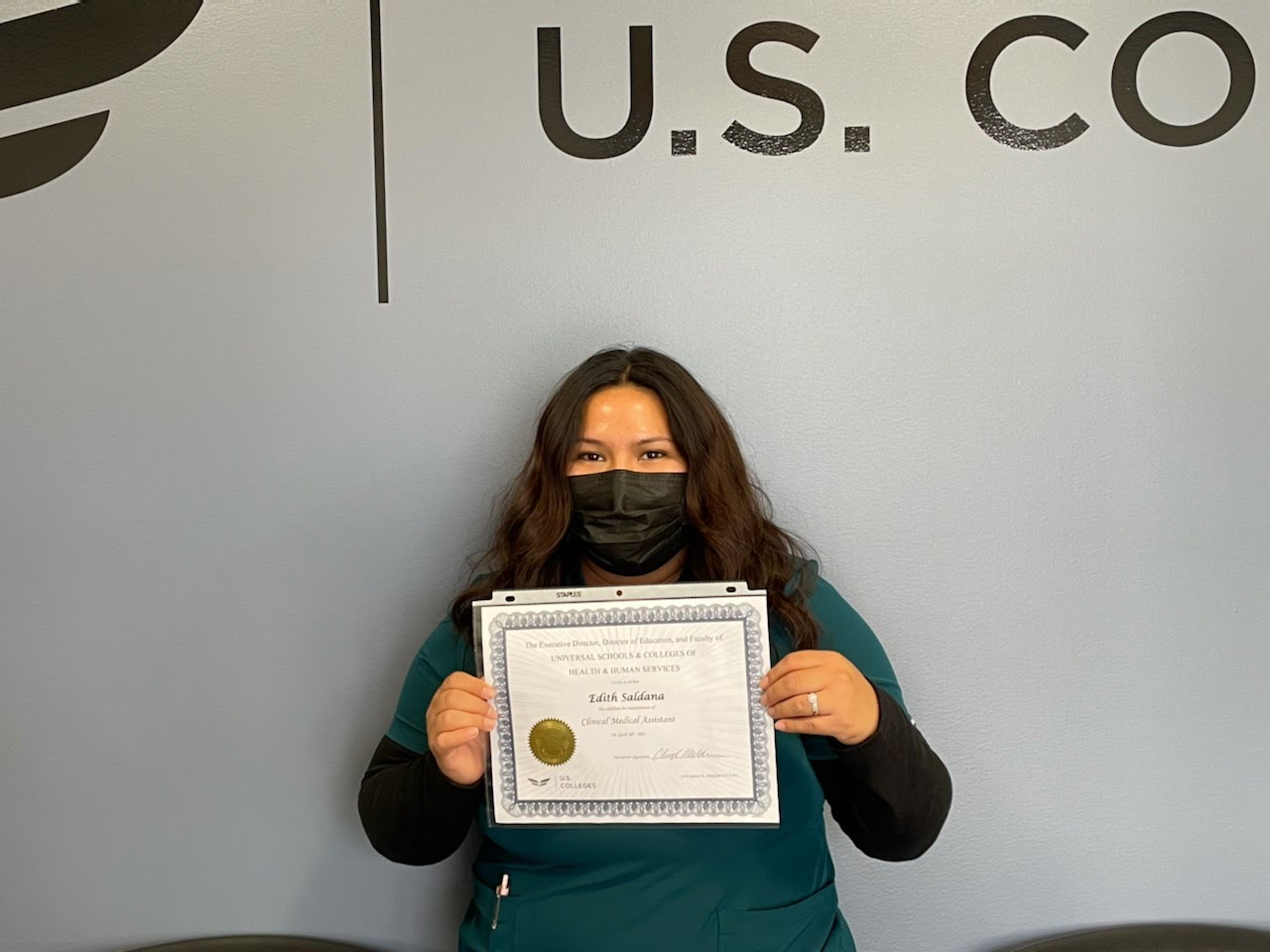REQUEST MORE INFORMATION
Ready to Make a Change? Get Started Today! Book a Campus Tour >
Clinical medical assistants play a vital role in healthcare settings. They do so by assisting physicians and other healthcare professionals in providing quality patient care. Clinical Medical Assistants perform both administrative and clinical tasks, ensuring the smooth operation of medical offices, clinics, and hospitals. If you are interested in pursuing a career as a clinical medical assistant in California, this comprehensive guide will walk you through the steps you need to take to pursue a Clinical Medical Assisting Career in the healthcare field.
If you're interested in becoming a Clinical Medical Assistant, consider enrolling in US Colleges Clinical Medical Assistant Program! The program is short-term, allowing you to pursue a career in the healthcare field fairly quickly.
How to Become a Clinical Medical Assistant in California?
To become a clinical medical assistant in California, you should follow these steps:
Step #1. Find a Good Clinical Medical Assistant Program
The first step that you need to take to become a Clinical Medical Assistant in California is to look for and find a reputable Clinical Medical Assisting Program. Finding a reputable program ensures that the program meets the standards of education and provides a comprehensive curriculum. US Colleges Clinical Medical Assistant Program does a great job of providing students with the knowledge, skills, and hands-on training that they need to hit the ground running.
Step #2. Complete a Clinical Medical Assistant Training Program
After you’ve found a Clinical Medical Assisting Program that you like, the second steps is to enroll in the program. You should enroll in a clinical medical assistant training program that covers both administrative and clinical aspects of the profession.
For example, the US Colleges Clinical Medical Assistant Program includes coursework in medical terminology, anatomy and physiology, medical office procedures, clinical procedures, and pharmacology. This training will equip you with the knowledge and skills necessary to succeed as a clinical medical assistant.
Step #3. Gain Hands-On Experience
Practical experience is crucial to becoming a competent clinical medical assistant. Seek out programs that offer clinical externships or internships, which provide opportunities to work in real healthcare settings under the supervision of experienced professionals. This hands-on experience allows you to apply your classroom knowledge in a practical setting and develop valuable skills. US Colleges Clinical Medical Assisting Program includes an externship, which will allow you to use the skills you’ve learned in a real-world setting.
Step #4. Consider Certification
Although certification is not mandatory to work as a clinical medical assistant in California, it is highly recommended. Certification demonstrates your competence and dedication to the profession. The American Association of Medical Assistants (AAMA) offers the Certified Medical Assistant (CMA) credential, which is widely recognized and preferred by employers. To become certified, you will need to pass an examination administered by the AAMA.
Step #5. Begin Applying for Clinical Medical Assistant Positions
Polish your resume, prepare for interviews, and start applying for clinical medical assistant positions. Leverage resources such as career services offered by US Colleges to enhance your job search. Networking and attending job fairs can also help you connect with potential employers.
How Long Does It Take to Become a Clinical Medical Assistant?
The duration of clinical medical assistant training programs can vary depending on the institution and the type of program you choose. Generally, completing a medical assistant program can take anywhere from several months to two years.
That said, US Colleges’ Clinical Medical Assisting Program can be completed in as few as 16 weeks, allowing you to pursue a career in the healthcare field fairly quickly. The program includes both classroom instruction and hands-on training, ensuring that you acquire the necessary knowledge and skills within a relatively short time frame.
That said, it is important to choose a program that fits your schedule and meets your educational needs. Consider factors such as program length, class schedules (day or evening classes), and the availability of part-time or online options when selecting a program that aligns with your goals.
What Does a Day in the Life of a Clinical Medical Assistant Look Like?
A day in the life of a clinical medical assistant can be dynamic and diverse, with a variety of responsibilities. While specific tasks may vary depending on the healthcare setting and the size of the facility, here are some common duties that medical assistants may perform:
Administrative Tasks
Clinical medical assistants handle administrative duties such as scheduling appointments, managing patient records, updating medical histories, and handling billing and insurance-related tasks.
Patient Care
Clinical medical assistants assist with patient care by measuring vital signs, such as blood pressure and temperature, and recording them in patient charts. They may also prepare patients for examinations, explain procedures, and provide support and reassurance.
Assisting with Procedures
Clinical medical assistants often assist physicians and other healthcare professionals during procedures and examinations. They may prepare the necessary equipment, sterilize instruments, and provide assistance as directed.
Collecting and Processing Samples
Clinical medical assistants may collect and prepare specimens for laboratory testing. They ensure proper labeling and documentation, and they may perform basic laboratory tests under the supervision of a licensed healthcare provider.
Communication and Patient Education
Clinical medical assistants communicate with patients, answering questions, providing instructions, and ensuring that patients who are seen understand post-care instructions or medication details. They serve as a bridge between patients and healthcare providers, ensuring effective communication and patient satisfaction.
Maintaining a Clean and Organized Environment
Clinical medical assistants help maintain a clean and organized healthcare environment. They sanitize and restock examination rooms, sterilize instruments, and ensure proper disposal of medical waste.
Is It Worth It to Become a Clinical Medical Assistant?
Becoming a clinical medical assistant can be a rewarding career choice for several reasons:
Growing Demand
The demand for qualified clinical medical assistants continues to rise due to an aging population and increased access to healthcare services. This demand creates a variety of job opportunities in healthcare settings, including hospitals, clinics, and physician's offices.
Job Stability
The healthcare field provides job stability, as people will always require medical care. Clinical medical assistants with the right skills and qualifications are likely to find employment opportunities and have a certain level of job security.
Quick Entry into the Workforce
Compared to many other healthcare professions, becoming a clinical medical assistant often requires a shorter training period. This allows you to enter the workforce more quickly and start gaining practical experience.
Versatility
Clinical medical assistants have the opportunity to work in diverse healthcare settings and specialties. This versatility allows you to explore different areas of interest and potentially specialize in a particular field later in your career.
Fulfilling Patient Interactions
Clinical medical assistants often have direct patient contact and play a crucial role in ensuring patient comfort and satisfaction. Building relationships with patients and contributing to their well-being can be personally fulfilling.
Is It Hard to Become a Clinical Medical Assistant?
Becoming a clinical medical assistant requires dedication, hard work, and commitment to learning. While the journey may be challenging for some, it is generally considered achievable with the right mindset and support. Here are a few things you should consider before beginning training to become a Clinical Medical Assistant:
Training Program
Choosing a reputable and accredited clinical medical assistant training program, such as the one offered by US Colleges, ensures that you receive quality education and comprehensive preparation for the field.
Practice and Experience
Like any profession, becoming proficient as a clinical medical assistant requires practice. Hands-on training opportunities and clinical externships provided by the program will help you gain practical experience and enhance your confidence.
Certification
While certification is not mandatory in California, obtaining certification, such as the Certified Medical Assistant (CMA) credential, can enhance your job prospects and demonstrate your commitment to excellence. Certification exams require thorough preparation, including reviewing study materials and taking practice exams.
Supportive Environment
Surrounding yourself with supportive instructors, classmates, and mentors can make the journey to becoming a clinical medical assistant more manageable. Seek guidance when needed and utilize available resources to enhance your learning experience.
Become a Clinical Medical Assistant With US Colleges
If you are ready to begin training to become a Clinical Medical Assistant in California, consider enrolling in the Clinical Medical Assistant Program offered by US Colleges. With accredited training, hands-on experience, experienced instructors, and career services, US Colleges is an excellent option that you should strongly consider.
By enrolling in the Clinical Medical Assistant Program offered by US Colleges, you will gain the necessary skills, knowledge, and confidence to excel in the field of clinical medical assisting. Start your journey today and take the first step towards a rewarding career in the healthcare field.
Enroll in US Colleges Clinical Medical Assisting Program to become a skilled Clinical Medical Assistant in the State of California.




